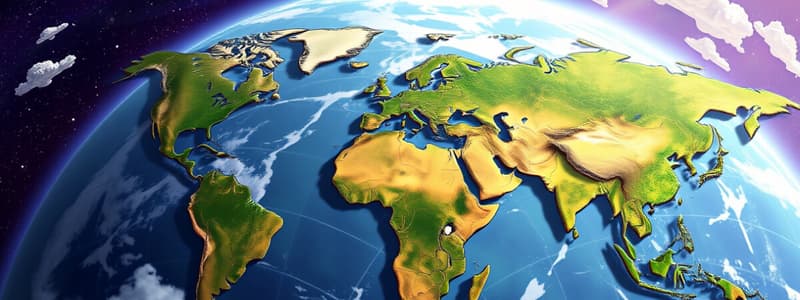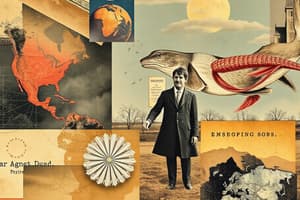Podcast
Questions and Answers
What is a continent?
What is a continent?
- A large tectonic plate
- One of the Earth's seven main divisions of land (correct)
- A type of ecosystem
- A large body of water
What is the role of geographers?
What is the role of geographers?
They study the Earth and its land, features, and inhabitants.
What do tectonic plates do?
What do tectonic plates do?
Move and interact with one another.
Define plate tectonics.
Define plate tectonics.
Subduction is when one tectonic plate moves under another.
Subduction is when one tectonic plate moves under another.
What is erosion?
What is erosion?
The outermost layer of the Earth is called the ______.
The outermost layer of the Earth is called the ______.
What is the mantle?
What is the mantle?
Where is the core located?
Where is the core located?
What is an ecosystem?
What is an ecosystem?
List the seven continents.
List the seven continents.
Which continent is known as the largest?
Which continent is known as the largest?
All continents border at least one ocean.
All continents border at least one ocean.
Europe and Asia are part of one landmass called Eurasia.
Europe and Asia are part of one landmass called Eurasia.
What was the name of the single large landmass that existed about 240 million years ago?
What was the name of the single large landmass that existed about 240 million years ago?
What are the features that all continents have?
What are the features that all continents have?
What are the Rocky Mountains?
What are the Rocky Mountains?
What is the longest mountain range in the world?
What is the longest mountain range in the world?
What is significant about the Amazon River?
What is significant about the Amazon River?
What famous feature is located in South America?
What famous feature is located in South America?
Study Notes
Key Vocabulary
- Continent: One of seven primary land divisions on Earth.
- Geographer: An expert who studies Earth's geography, landforms, and inhabitants.
- Tectonic Plate: Large segments of Earth's crust that interact and move.
- Plate Tectonics: Theory describing the movement of tectonic plates and their geological impact.
- Subduction: Process in which one tectonic plate slides beneath another.
- Erosion: Removal of soil and rock by natural forces such as wind or water.
- Crust: Earth's outermost layer.
- Mantle: Layer between Earth’s crust and core.
- Core: Central part of Earth beneath the mantle.
- Ecosystem: Interaction between living organisms and their physical environment.
Continents Overview
- Earth consists of seven continents: Asia, Africa, North America, South America, Antarctica, Europe, and Australia.
- Nearby islands are often included with continents for geographical classification, e.g., Japan is part of Asia.
Continental Area
- Combined, continents cover approximately 148 million square kilometers (57 million square miles).
- Oceans cover almost three-fourths of Earth's surface, influencing continental borders.
- Asia has the longest coastlines of all continents.
Continental Features
- Continental boundaries are defined by continental shelves, which are shallow areas extending into the ocean.
- Regions like Europe and Asia are part of Eurasia but exhibit distinct cultural identities.
Formation of Continents
- Earth formed around 4.6 billion years ago from cosmic dust and gas; heat caused lighter materials to form the crust and heavier ones to settle into the core.
- Continents formed through tectonic movements and subduction, leading to volcanic activity and the formation of igneous rock.
Moving Continents
- Continents were once clustered around the Equator 480 million years ago, later forming the supercontinent Pangaea by 240 million years ago.
- Pangaea began to split about 200 million years ago, leading to the current arrangement of continents, which drift at about 2.5 centimeters (one inch) annually.
Continental Changes
- Continents undergo shape changes due to tectonic activities involving mountain building, erosion, and sediment accumulation.
- Each continent features diverse landscapes, including mountains, plains, and river systems.
North America
- Extends from Alaska's Aleutian Islands to the Isthmus of Panama, including Greenland.
- Features include the Rocky Mountains in the west and the Appalachian Mountains in the east, alongside fertile plains for agriculture.
- Notable geographical formations include the Grand Canyon, Yellowstone National Park's geysers, and the Great Lakes.
South America
- Linked to North America via the Isthmus of Panama, spanning from the Caribbean Sea to Antarctica.
- Home to the Andes, the world's longest mountain range, and the Amazon River, known for its water volume.
- Features notable landmarks such as Angel Falls, the highest waterfall globally, and extensive rainforests rich in biodiversity.
Studying That Suits You
Use AI to generate personalized quizzes and flashcards to suit your learning preferences.
Related Documents
Description
Test your knowledge with this quiz on key vocabulary related to continents and Earth science. Understand essential terms like tectonic plates, erosion, and ecosystems, and their importance in geography. Ideal for geography students and enthusiasts!




